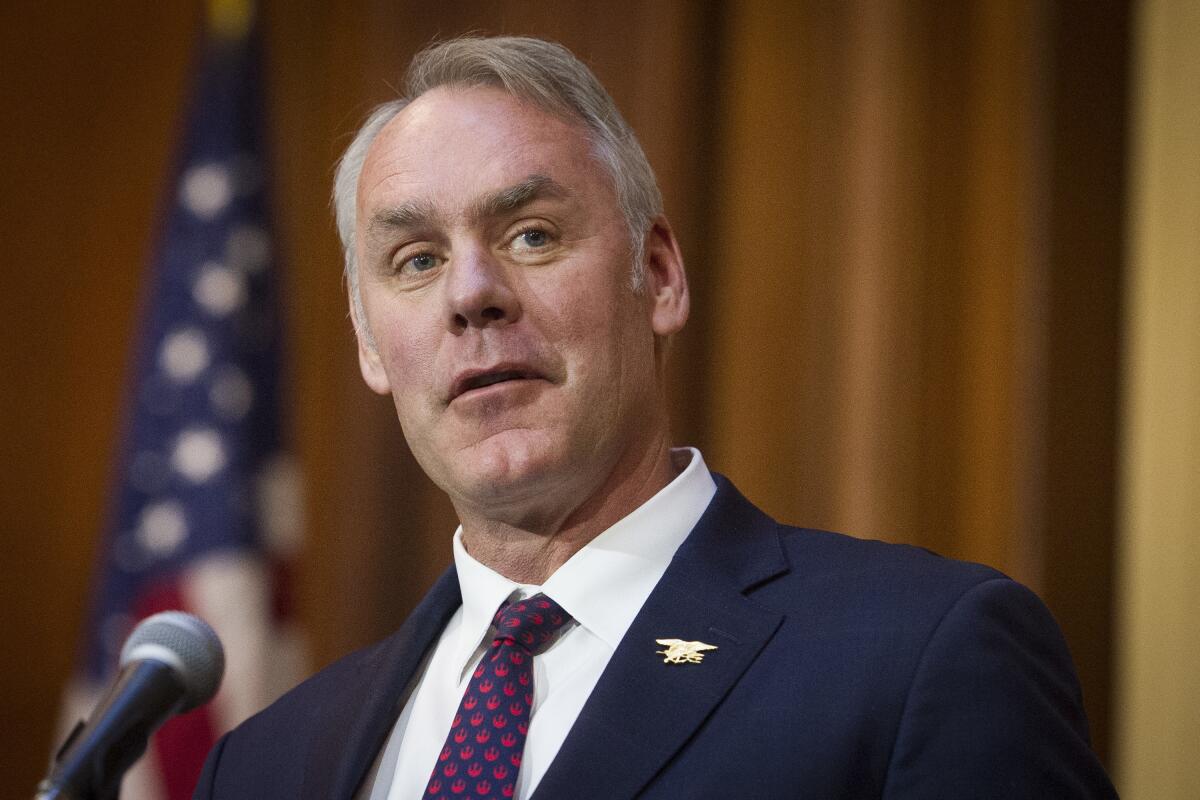Ryan Zinke, Trump’s Interior secretary, misused his office and lied, investigators say

- Share via
BILLINGS, Mont. — Trump administration Interior Secretary Ryan Zinke misused his position to advance a commercial development project that included a microbrewery in his Montana hometown and lied to an agency ethics official about his involvement, according to a report by federal investigators released Wednesday.
The investigation by the Interior Department’s inspector general found that Zinke continued work on the commercial project through a nonprofit foundation in the resort community of Whitefish, Mont., even after he committed upon taking office to break ties with the foundation.
The report also said that Zinke gave incorrect and incomplete information to an Interior Department ethics official who confronted him over his involvement, and that Zinke ordered his Interior Department staff to help him with the project, a misuse of his position.
The Great Northern Veterans Peace Park Foundation was created by Zinke and others in 2007 to build a community sledding hill in Whitefish, a tourist town about 25 miles from Glacier National Park and near the Canadian border. BNSF Railway donated several acres of land to the foundation in 2008 to establish the park.
After President Trump named him Interior secretary in 2017, Zinke agreed to cut ties with the foundation and to stop providing it with his services.
But after resigning as the foundation’s president and while he was still Interior secretary, Zinke engaged in “repeated, ongoing substantive negotiations” with developers about the use of foundation property for a commercial project known as 95 Karrow, investigators said. The project included a potential microbrewery.
Zinke is a candidate in the June Republican primary for Montana’s open at-large congressional seat, a position he held before joining Trump’s Cabinet.
His campaign criticized the investigative report as “a political hit job” and said in a statement that the involvement of Zinke’s family with the foundation led to the restoration of railroad land into a park for sledding.
“They are proud of the children’s sledding park that dozens of kids use every weekend and countless locals use for exercise every day,” the campaign statement said.
The department’s inspector general’s office — led by Inspector General Mark Greenblatt, a Trump nominee — referred the results of the Zinke investigation to federal prosecutors for potential prosecution.
But the prosecutors who work for Atty. Gen. Merrick Garland, appointed by President Biden, declined to pursue criminal charges in the summer of 2021, according to the investigative report.
Zinke and his wife, Lola, declined interview requests from federal investigators who were looking into the land deal.
Emails and text messages from others who were involved in the development project show that Zinke continued to communicate with developers even after resigning from the foundation in March 2017 and days after the Senate confirmed him as secretary, according to investigators. The messages were obtained through subpoenas to the developers, whom the report does not name.
“The evidence that we obtained reflected that Secretary Zinke exchanged at least 64 emails and text messages and engaged in multiple phone calls in which he represented the foundation in negotiations related to the 95 Karrow project,” investigators wrote.
The report added: “He was not simply a pass-through for information to and from the foundation; to the contrary, several of his own messages make clear that he personally acted for or represented the foundation in connection with the negotiations.”
In one emailed message, a person identified in the investigative report as “developer 1” wrote that Zinke wanted a piece of property transferred to the park for the brewery.
Investigators concluded Zinke had “apparent interest in operating a microbrewery on site,” but the report did not give more details about the proposed transaction or who was involved.
The email also said Zinke had asked for the “exclusive right to produce alcohol on 95 Karrow,” but the investigative documents did not say who would be the owners of the microbrewery.
Zinke’s Interior Department staff became involved when he directed them to arrange a meeting with three of the project’s developers at his office in August 2017 and later to arrange dinner for the group following a tour of the Lincoln Memorial that was led by Zinke.
Zinke’s staff also printed documents for him related to 95 Karrow, a violation of rules against using subordinates to perform nonofficial duties, the investigative report said.
Zinke was questioned in July 2018 by an Interior Department ethics official about those interactions, his role in the foundation and the development project. The interview followed news reports that the foundation had entered an agreement with 95 Karrow’s developers.
During the interview, Zinke denied any substantive involvement in the project, according to the report. The ethics official later said that Zinke had “misrepresented” the facts and called Zinke’s statements “disappointing ... and very concerning,” according to the report.
House members including Rep. Raul M. Grijalva (D-Ariz.), chairman of the House Natural Resources Committee, had requested an investigation into Zinke’s involvement in the project.
Grijalva said the findings show that Zinke used his office to advance his personal interests and attempted to use the peace park to “force inclusion of a brewery” in the development.
The investigation into the land deal was one of numerous investigations of Zinke that began when he was in Trump’s Cabinet.
In another case, investigators found that he violated a policy prohibiting nongovernment employees from riding in government cars after his wife traveled with him, but he said ethics officials approved it. Zinke was cleared of wrongdoing following a complaint that he redrew the boundaries of a national monument in Utah to benefit a state lawmaker and political ally.
During almost two years overseeing the agency responsible for managing 781,000 square miles of public lands, Zinke’s broad rollbacks of restrictions on oil and gas drilling were cheered by industry.
They were denounced by environmental groups and Democratic lawmakers who accused him of putting corporate profits ahead of preservation.
When he resigned from the Interior Department, Zinke said it was because of politically motivated attacks that had created a distraction from his duties.
In the weeks leading up to departure, the White House had concluded Zinke was probably the Cabinet member most vulnerable to investigations as Democrats were poised to take the majority in the House, a Trump administration official said at the time.
Investigators with the Interior Department’s inspector general’s office found no evidence that Zinke took any actions to benefit the chairman of the energy company Halliburton, who was also involved in the development, or that members of Zinke’s staff tried to conceal Zinke’s involvement.
More to Read
Get the L.A. Times Politics newsletter
Deeply reported insights into legislation, politics and policy from Sacramento, Washington and beyond. In your inbox three times per week.
You may occasionally receive promotional content from the Los Angeles Times.










